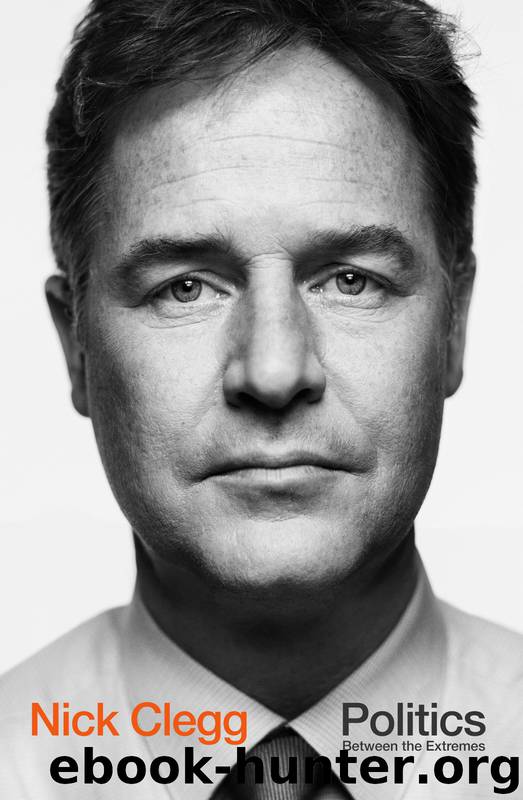Politics by Nick Clegg

Author:Nick Clegg
Language: eng
Format: epub
ISBN: 9781473545731
Publisher: Random House
Douglas’s theory built upon the thinking of Claude Lévi-Strauss, the French structural anthropologist, who proposed the theory of binary opposites. According to Lévi-Strauss, meaning derives from the relationship between things rather than from the things themselves, and above all through relationships of opposition: we understand something to be black because it is the opposite of white, and vice versa; in the same way we understand concepts such as male/female, dirty/clean, sacred/ profane, left/right only through their binary opposition to one another.
The work of structural anthropologists is not uncontroversial and cannot be ‘proved’ in the strictly scientific sense. Nonetheless, it may help explain why people from different sides of the political spectrum unite with such ferocity in rejecting any person or party who muddies the political waters and messes up the neatly bifurcated political map with which they feel familiar.
The difficulty of accommodating more than two sides to an argument is obvious enough in the everyday language used to portray politics. News reports of political disputes invariably lead with one voice or argument and then include a response from an opposing voice. Third- or fourth-party voices are rarely heard. The very language of debate – phrases such as ‘on the one hand, and on the other’, ‘there are two sides to every story’, ‘the other side of the argument’ – does not easily lend itself to three-, four- or five-sided arguments. The confrontational architecture of the House of Commons and our winner-takes-all electoral system only reinforce the two-sided choreography of our politics. Elections themselves, of course, also boil down to a binary opposite: continuity versus change. In the end, once the blizzard of policy promises from political parties has been showered on the electorate, a simple choice remains. One lot will say that it is better to stick with what you’ve got, not to rock the boat. Another lot will say it’s time for a change, throw the rascals out.
The difficulty of being a third voice – an interloper in this polarised choice – is stark. In the 2015 general election, the Lib Dems were in effect condemned to saying a little bit of both: advocating continuity for many of the things we had done in coalition, not least to avoid derailing the economy; at the same time, advocating change. But saying a little bit of both doesn’t get you very far, especially in an election campaign as polarised as the 2015 campaign. The Conservatives, as the larger coalition partner, were far more plausible in presenting themselves as a party of continuity and stability. Labour, as the opposition, were clearly the party of change. Our dilemma was that we could never present ourselves as the more plausible party of either. Portrayed as a party of neither the left nor the right but of the centre ground, of neither continuity nor change but of ‘moderation’ and ‘restraint’, we were simply not a compelling answer to the question that came to define the election campaign: do you stick with a Conservative-led government, or
Download
This site does not store any files on its server. We only index and link to content provided by other sites. Please contact the content providers to delete copyright contents if any and email us, we'll remove relevant links or contents immediately.
| Anthropology | Archaeology |
| Philosophy | Politics & Government |
| Social Sciences | Sociology |
| Women's Studies |
The Secret History by Donna Tartt(16643)
The Social Justice Warrior Handbook by Lisa De Pasquale(11492)
Thirteen Reasons Why by Jay Asher(7796)
This Is How You Lose Her by Junot Diaz(5789)
Weapons of Math Destruction by Cathy O'Neil(5045)
Zero to One by Peter Thiel(4831)
The Myth of the Strong Leader by Archie Brown(4795)
Promise Me, Dad by Joe Biden(4452)
Beartown by Fredrik Backman(4426)
Stone's Rules by Roger Stone(4420)
How Democracies Die by Steven Levitsky & Daniel Ziblatt(4407)
The Fire Next Time by James Baldwin(4348)
100 Deadly Skills by Clint Emerson(4084)
A Higher Loyalty: Truth, Lies, and Leadership by James Comey(4038)
Rise and Kill First by Ronen Bergman(4016)
The David Icke Guide to the Global Conspiracy (and how to end it) by David Icke(3889)
The Farm by Tom Rob Smith(3878)
Secrecy World by Jake Bernstein(3787)
The Doomsday Machine by Daniel Ellsberg(3736)
